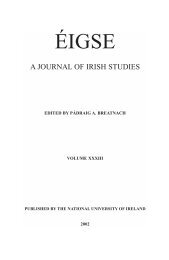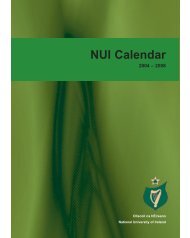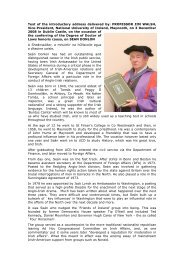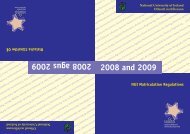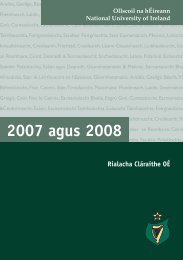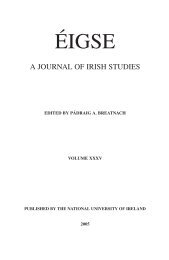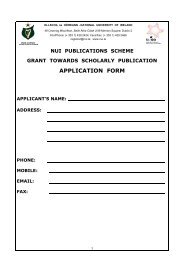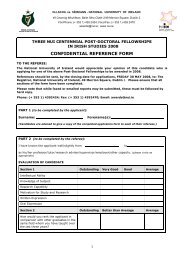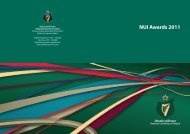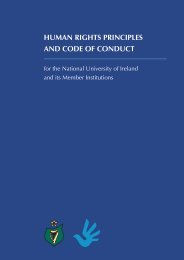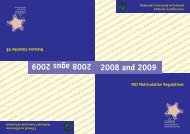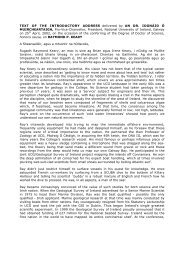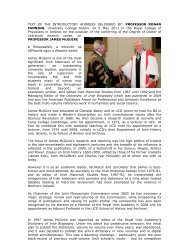Eigse Paged 2004 - National University of Ireland
Eigse Paged 2004 - National University of Ireland
Eigse Paged 2004 - National University of Ireland
You also want an ePaper? Increase the reach of your titles
YUMPU automatically turns print PDFs into web optimized ePapers that Google loves.
ENCOUNTER AT THE FORD 17<br />
learns that he has struck a fairy woman, who was seeking to take him<br />
as her mate. 20<br />
In his article on Cú Chulainn and the Cronn, Nagy also discussed<br />
the implications <strong>of</strong> another scene in the Táin in which martial activity,<br />
water, and female sexuality all come together. As he seeks to protect<br />
his province from invasion, Cú Chulainn is approached and<br />
solicited by a beautiful young woman, eventually identified as the<br />
war goddess known as the Morrígain. At first he tries to excuse himself<br />
on account <strong>of</strong> the danger <strong>of</strong> the situation, and the physical strain<br />
which he is undergoing: Ní haurussa dam-sa dano comrac fri banscáil<br />
céin no mbeó isind níth so ‘It is not easy for me to come<br />
together with a woman while I am in this struggle.’ 21 When she <strong>of</strong>fers<br />
to help him, Cú Chulainn becomes abusive: Ní ar thóin mná dano<br />
gabus-sa inso ‘It is not for the sake <strong>of</strong> a woman’s backside that I<br />
undertook this.’ 22 The Morrígain then turns against him, threatening<br />
to attack him in the shapes <strong>of</strong> various animals when he is next fighting<br />
in the waters <strong>of</strong> the ford. When she does in fact attack him in this<br />
way he puts out one <strong>of</strong> her eyes, and breaks one <strong>of</strong> her ribs and one<br />
20<br />
There are one hundred and fifty versions <strong>of</strong> the story in the archives <strong>of</strong> the<br />
Department <strong>of</strong> Irish Folklore, <strong>University</strong> College Dublin / <strong>National</strong> <strong>University</strong> <strong>of</strong><br />
<strong>Ireland</strong>, Dublin. For a recent discussion, see Miceal Ross, ‘The knife against the<br />
wave: a uniquely Irish legend <strong>of</strong> the supernatural?’ Folklore 105 (1994) 83-8; a<br />
notable instance is discussed by Tomás Ó Con Cheanainn, ‘Seanchas ar Mhuintir<br />
Laidhe’ Éigse 33 (2002) 179-225 (at pp 208-9).<br />
21<br />
There is a play on words here, as comrac can designate combat as well as a sexual<br />
encounter; for comparable exploitation <strong>of</strong> the word’s ambiguities in conjunction<br />
with níth (and its rhyming antonym síth) see John Carey, ‘The rhetoric <strong>of</strong> Echtrae<br />
Chonlai’ CMCS 30 (Winter 1995) 41-65 (at pp 53-4). Jacqueline Borsje suggests to<br />
me that it may be significant in this connection that Níth is one <strong>of</strong> the names <strong>of</strong> the<br />
hag Cailb in Togail Bruidne Da Derga, a figure who shares other names with the<br />
Morrígain (LU l. 6980). The next in the list <strong>of</strong> Cailb’s names is Némain: cf. the river<br />
Níth Némannach (e.g. LL l. 2407), now the Dee in Co. Louth.<br />
22<br />
The phrase tón mná recurs in other passages which express the idea that sexual<br />
desire can induce a man to disregard or transgress political boundaries. An early<br />
account <strong>of</strong> the cattle-raid <strong>of</strong> Cuailnge states that Fergus ‘turned against the Ulaid for<br />
the sake <strong>of</strong> a woman, i.e. for the sake <strong>of</strong> Medb <strong>of</strong> Cruachu; for he waged war against<br />
his own people for the sake <strong>of</strong> a woman’s backside’ (fecca[i]s... for Ulta di āg mnā<br />
.i. di āg Medba Crūachan, ar imgeogain ar imtoin mnā fria chenēl fadessin, Kuno<br />
Meyer, ‘The Laud genealogies’ 305). In the Táin itself Conall Cernach berates<br />
Fergus for fighting against his own folk ‘for the sake <strong>of</strong> the backside <strong>of</strong> a wanton<br />
woman’ (ar thóin mná drúithi, TBC I l. 4069); and the law tract Do Thuaslucad<br />
rudrad speaks <strong>of</strong> the diminished status <strong>of</strong> the man in-etet toin a mna tar crich ‘who<br />
follows his wife’s backside across a border’ (CIH 427 ll 3-4).



